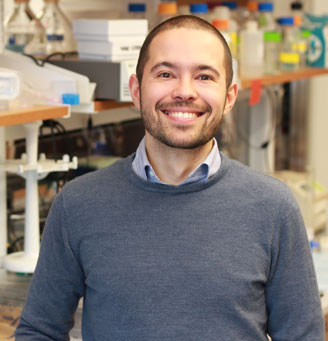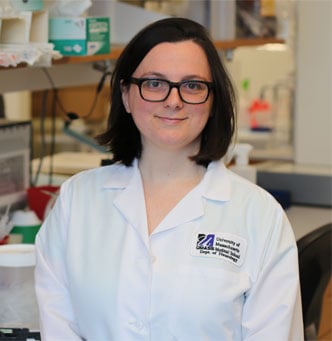 |
|
|
Bruno Miguel de Cruz Godinho, PhD |
|
 |
|
|
Jeanne McKeon, PhD |
Jeanne McKeon, PhD, and Bruno Miguel da Cruz Godinho, PhD, have been awarded Milton Safenowitz Postdoctoral Fellowships by the ALS Association, an honor that includes $100,000 each over two years to support their ongoing research of amyotrophic lateral sclerosis, the progressive neurodegenerative disease that affects nerve cells in the brain and spinal cord.
The program, founded by the Safenowitz family through the Greater New York Chapter of the ALS Foundation in memory of Milton Safenowitz, who died of ALS in 1998, is designed to encourage promising young scientists to enter the ALS field and facilitate their research. Drs. McKeon and Godinho were two of only six fellows chosen this year. Fellows work with a senior mentor and receive extensive exposure to the ALS research community through meetings and presentations. After completing the fellowship, 90 percent of fellows continue to pursue ALS research.
“I’m grateful for the ALS Association grant. It’s very nice to have your research recognized and appreciated in the field,” McKeon said.
McKeon, who works in the lab of Daryl A. Bosco, PhD, associate professor of neurology, is studying the disruption of actin network dynamics as a pathogenic mechanism in ALS. Specifically, McKeon is working to understand how mutations in Profilin 1, an actin-binding protein critical for cytoskeletal structure and function, might contribute to protein misfolding and the gain or loss of protein function.
“I’m trying to understand more from a cell biology perspective how mutations in Profilin 1 can cause neurodegeneration and specifically in motor neurons, the primary affected cell-type in ALS,” McKeon said.
As a Milton Safenowitz fellow, Godinho’s goal is to identify and develop a simple, efficient and nontoxic delivery strategy for RNAi drugs to enable silencing of ALS-defined targets SOD1 and C9orf72, mutant genes associated with familial inherited ALS. By using technology developed in the lab of Anastasia Khvorova, PhD, professor in the RNA Therapeutics Institute, Godinho will research innovative hydrophobic small interfering RNA (siRNA) scaffolds as novel therapeutic paths for potential treatment of ALS.
“We’re developing this compound for central nervous system delivery; we have done brain injections and we have done some spinal cord and we see that the compounds do diffuse very well in both locations. It is a great opportunity for us to apply this technology specifically to ALS,” Godinho said, referring to studies done in mouse models.
In collaboration with Robert H. Brown Jr., DPhil, MD, the Leo P. and Theresa M. LaChance Chair in Medical Research and chair and professor of neurology, Godinho will work to validate the efficacy of these compounds against SOD1 and C9orf72 in the brain and spinal cord, and determine their functional therapeutic efficacy in established mouse models of ALS. The work could establish a foundation for the development of effective drugs for ALS and other neurodegenerative diseases.
Godinho’s fellowship grant is being funded by Christopher Pendergast from Ride for Life through the ALS Association.